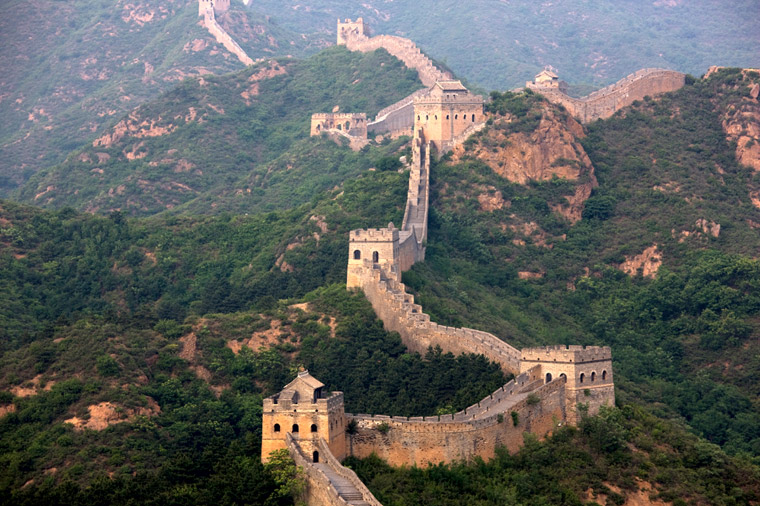Since China is a country which lends itself so well to myth-making and mystification, it is hardly surprising that misunderstandings about Chinese history abound. Some misconceptions are more common among outsiders, some among the Chinese themselves, and some are shared by all sides.
Here are five of the most commonly heard myths about China's past.
1)
China was historically cut off from the world
Many outsiders see China as a country which was completely sealed off from foreign influence for thousands of years. Ancient China was indeed a relatively isolated civilization, surrounded by deserts and impassable mountain ranges. The Himalayas separated it from India, Asia's other great civilization, and its Northern and Western borderlands were made up of huge, inhospitable expanses of steppe and desert. Its main foreign contacts were with its own Confucian offshoots of Japan, Korea and Vietnam.
Having said that, China was far from completely cut off or impregnable, both geographically and ideologically. In the most obvious case of ideological contamination, Buddhism was introduced to China from India over 2000 years ago, and became the country's most visible religion. Later on, the Silk Road brought a large amount of foreign people and ideas into China. Especially during the Tang Dynasty (618-907), often seen as China's most glorious period, the country was quite cosmopolitan.
The Tang capital Chang'an (modern Xian) was one of the most international cities in the world, as well as one of the largest. It included a Persian bazaar catering to Iranian tastes, and Nestorian Christian, Muslim, Jewish and Zoroastrian places of worship. It was during this period that Islam arrived in China and drew quite a number of Chinese converts, as testified by the Hui Muslims today. It was also at this time that China's only traditional Jewish community was formed, by foreign Jews who settled in Kaifeng. They lived completely free of ethnic persecution for centuries, until they gradually assimilated. This shows that it wasn't always impossible for outsiders to become Chinese.
Of course China's traditional openness shouldn't be exaggerated either. Even during the Tang Dynasty, laws were passed segregating foreigners from Chinese in the capital. The Chinese attitude towards outsiders was always ambiguous and tinged with suspicion. Even though the definition of Chineseness was not racial, foreigners had to adopt Chinese customs in order to be accepted. The non-Chinese peoples in China's vicinity were looked down upon as Barbarians. In later dynasties, attitudes became increasingly negative and inward-looking.
2)
Ancient China was sexually conservative
Many Chinese have come to see their own tradition as a sexually conservative one, while sexual openness is associated with the West (and the Japanese, who are seen as a people of closet perverts). The reality however is that for most of history the opposite was the case.
Since they did not follow monotheistic religions like Christianity or Islam, with their obsession over what people do in bed, in the past the Chinese had a much more relaxed attitude towards sexuality than Europeans did. The local religion/philosophy of Daoism saw sex as a path to happiness and longevity. Sex was not really a taboo, especially for the upper classes who knew how to enjoy themselves. Wealthy men would often have numerous concubines, and prostitution was allowed and regulated during some periods.
Even homosexual activity was tolerated in old China, at least as a way for men to release their sexual tension. Although the idea of people being exclusively homosexual was rare, just like in Ancient Greece homosexual relationships "on the side" were not seen as a problem. Some emperors even had male lovers within their harems.
The Chinese however shifted back and forth in their attitudes, and the Qing Dynasty was a comparatively puritan period. Then the Europeans came crashing into China's history, and the Chinese were influenced by the puritan Western attitudes on sexuality and marriage. Only now are attitudes starting to become more liberal again.
Having said that, I do think that some of the old tolerance is still visible in China today. In spite of homosexuality being illegal until 1997, most Chinese don't really seem too bothered by it (as long as it is not their own children who are gay, since they are expected to marry and give them grandchildren). Attitudes are certainly much more relaxed then in Muslim countries or Africa, where a violent opposition to homosexual love is still the norm. Sex shops also operate pretty openly in cities across China. And let's not forget the mind-boggling custom of inviting strippers to perform at funerals, which
sporadically occurs in rural areas (although many people wouldn't dream of it, and the government keeps trying to put an end to it). Or Taiwan's half-naked "
betel nut beauties".
3)
China has 5000 years of history
Most people around the world would shake their head if asked exactly how long their country's history was. In China however,
everyone knows the answer: China's history is 5000 years long. The 5000-year trope is learned in schools across the country and generally accepted as fact. Even foreigners who move to China quickly take it up. The problem is that it is a highly dubious claim.
It is hard to define when a nation's history starts, but no matter whether we take the adoption of writing or the emergence of the first cities as the starting point, China's history is not 5000 years old. The first accepted example of Chinese writing are the oracle bones, which date back to just over 3000 years ago. Chinese history prior to the Shang Dynasty (1600-1046 BC) is hard to disentangle from myth. Farming probably did exist in China 5000 years ago, but this is true of many other places as well.
While is not true that China developed civilization earliest (Iran, Egypt and most of the Middle East definitely came first), there might be something to the claim that China is the world's "longest continuous civilization". Chinese imperial history does indeed present an amazing degree of coherence and continuity from the time of the Qin Dynasty (221-206 BC), the first real Chinese empire, until the Republican revolution of 1911.
The Chinese imperial system, based on the pillars of Confucianism and the examination system, was probably the longest lasting political construct of all times. It even maintained exactly the same official written language for over two millennia. No other country, from India to Egypt to Italy, can claim anything quite like it.
4)
The Korean and Japanese languages come from Chinese
In spite of what most Chinese (and many others) believe, the Korean and Japanese languages do not derive from Chinese. To a linguist, they very obviously belong to a completely different family of languages. Their phonetics, structure and basic vocabulary all attest to this. Most linguists classify both Korean and Japanese as language isolates. Some see them as related to each other, and possibly even to Mongolian and Turkish (highly contentious). Nobody however relates them to Chinese.
The reasons for the persistence of this myth are easy to see: historically the Koreans and Japanese received much of their culture from China, which was the main center of civilization in East Asia. As such, a huge amount of Chinese vocabulary seeped into both languages. This can be compared to the way that a large amount of French vocabulary penetrated into English after the Norman invasion. Even nowadays, many Korean and Japanese words maintain a pronunciation similar to the Chinese equivalent.
What's more, both the ancient Koreans and the Japanese took to using Chinese characters to write down their own languages. The problem is however that the structure of these two languages differs considerably from Chinese. The latter is an analytic language, containing no grammatical inflections (no tenses, no voices, no singular and plural forms etc). Words never change their form. Korean and Japanese, on the other hand, do have plenty of grammatical inflections. As such, the non-phonetic Chinese writing system isn't really suited to representing these languages.
As a result, both the Japanese and the Koreans eventually developed phonetic alphabets of their own, which they would often mix with Chinese characters when they wrote. The Koreans have now almost abandoned the use of Chinese characters, except in ceremonial contexts. The Japanese continue mixing the different writing systems all the time.
To a linguist, however, the use of the same writing system and the presence of much borrowed vocabulary does not mean that Korean or Japanese can be said to derive from Chinese, in any way, shape or form. They are, rather, unrelated languages which were heavily influenced by Chinese throughout history.
5)
Genghis Khan was Chinese
This particular misconception is only widespread within China, where most people take it as unquestionable fact. This is because of the way Chinese schoolchildren are taught their history.
To many Chinese, the Mongols are historically a part of the Chinese nation. It is true that the whole of what is now the Republic of Mongolia belonged to China throughout the Qing dynasty (1644-1912). China currently still rules over part of historic Mongolia, the province known as "Inner Mongolia". Although most of the province's population is not Mongol, there are still more Mongols within China's border than there are in the independent state of Mongolia. Mongols are thus officially classified as one of China's 55 ethnic minorities, which is reasonable enough.
The Mongols of the 12th century, however, were simply not Chinese. Genghis Khan, who was born North of Ulan Bataar, would never have seen himself as Chinese. If anyone had suggested it to him, he might well have cut their heads off. It is true that his grandson Kublai Khan conquered the whole of China and founded the Yuan dynasty. He then posthumously declared his grandfather to be the founder of the Dynasty, or 太祖.
Chinese schoolbooks now describe the Yuan dynasty as a legitimate Chinese dynasty, but at the time most Chinese despised the Mongols as foreign invaders. Even if you want to define China's Mongol rulers as Chinese, however, extending this posthumously to Genghis Khan is quite preposterous.


